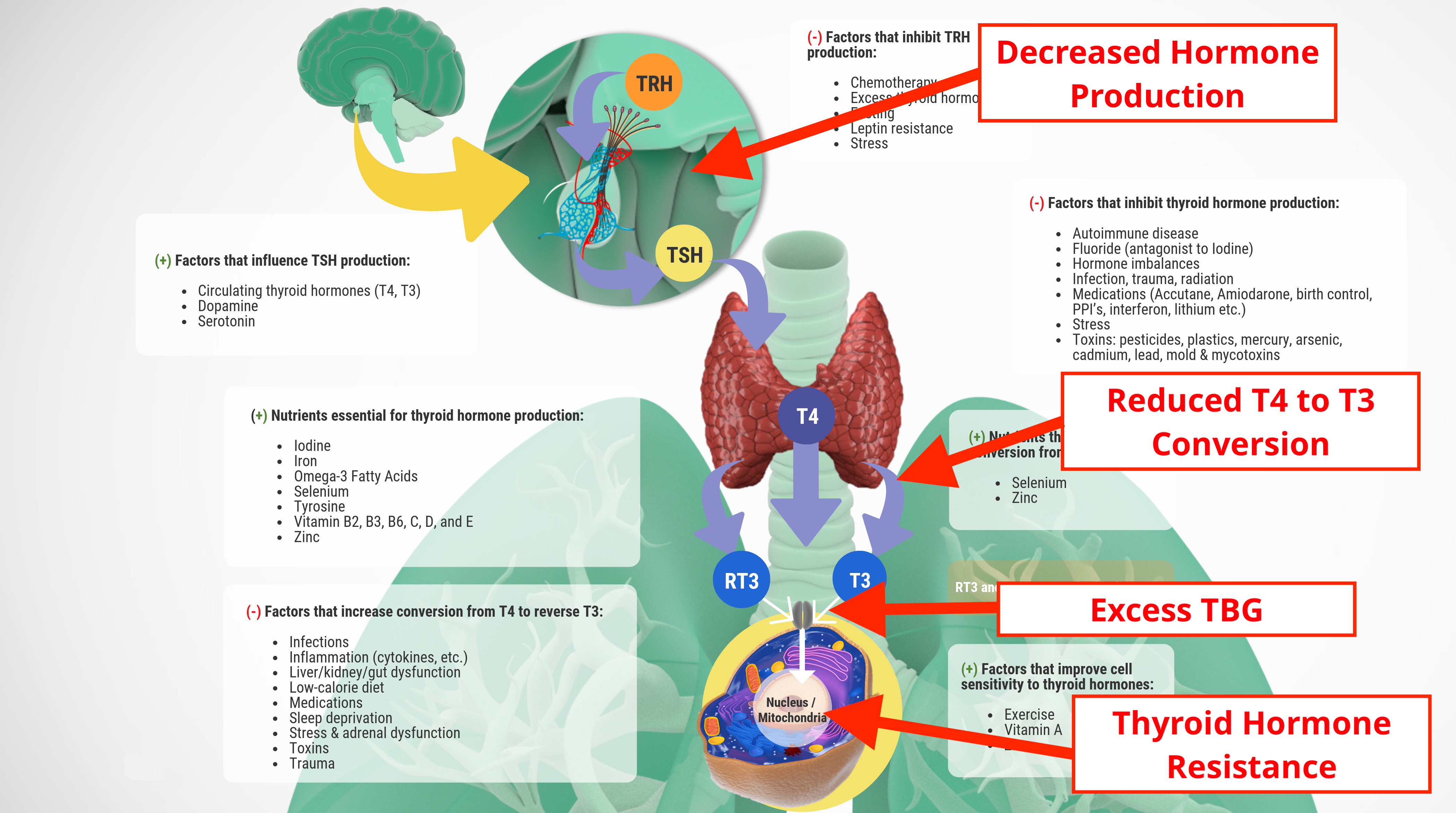If you have Hashimoto’s, Graves’, or any other thyroid condition and you report feeling exhausted or “tired and wired”, your doctor will likely blame your thyroid and want to up your medication.
After all, your thyroid regulates your metabolism and energy levels, and fatigue is a classic thyroid symptom.
So you increase your thyroid hormone dose and your energy picks back up! But then…it starts tanking again, and you start the process all over. More meds, more energy, more fatigue.
Instead of simply masking the fatigue with more medication, doesn’t it make more sense to investigate what’s really causing it and correct it at the source?
In many cases, adrenal dysfunction is to blame, either because it’s causing the fatigue itself or it’s messing with your thyroid function and leading to low energy.
Let’s look at how the two are connected, and why fixing one while ignoring the other won’t get you the results you’re looking for.
What is Adrenal Fatigue?
Your adrenal glands produce hormones that help your body respond and deal with stress.
When your stress levels are too high, or they’re elevated for too long, your adrenal glands can no longer keep up with the demand, and your anti-stress hormone levels plateau or plummet. This is known as adrenal fatigue.
Adrenal fatigue is incredibly common, thanks to the chronic stress most of us face on a daily basis.
Symptoms of adrenal fatigue include:
- Exhaustion and fatigue
- Difficulty falling asleep or staying asleep
- Feeling “tired but wired”
- Being a slow starter in the morning
- Feeling dizzy when you stand up too fast
- Poor reactions to caffeine, alcohol, sugar, or fragrances
- Unexplained weight gain or weight loss
- Salt cravings
- Overwhelm
- Irritability
Notice that many of these symptoms are also hallmarks of a thyroid problem. It’s no surprise that most doctors overlook the adrenals and jump straight to blaming the thyroid. In reality, the issue is usually more multifactorial, thanks to the complex relationship between the two.
Your Hormone Web
You can think of your endocrine system as one big, interconnected web regulating all of your hormones. This includes sex hormones (estrogen, progesterone, and testosterone), thyroid hormones, and the anti-stress hormones produced by your adrenal glands (cortisol, adrenaline, etc).
This web is responsible for a huge range of important functions, such as energy, sleep, metabolism, mood, reproduction, and more. Because these functions are connected via one intricate web, a disruption in one area can cause a ripple effect in others.
How Adrenal Fatigue Sabotages Thyroid Function
When your adrenal hormone levels skyrocket and plummet, or remain high day after day, it impacts virtually every point of the thyroid hormone process.

Here are the mechanisms by which adrenal imbalance can wreak havoc on thyroid function:
- A reduction in thyroid hormone production – high cortisol levels from your adrenal glands cause your hypothalamus and pituitary gland to slow down on making thyroid hormones
- Excess thyroid-binding globulin (TBG) – elevated cortisol leads to increased estrogen and TBG, which keeps thyroid hormones bound up in your bloodstream instead of entering your cells
- Reduced T4 to T3 conversion – this leaves thyroid hormones stuck in their inactive state
- Thyroid hormone resistance – this makes your cells less receptive to thyroid hormones so you need higher and higher levels of them
This ripple effect is why simply throwing more thyroid medication at the problem WON’T solve your fatigue in the long run if it’s caused by adrenal insufficiency.
You’ll likely just feel more “tired but wired”, thanks to the artificially high levels of synthetic hormones. And worse, you may develop even more symptoms over time.
This is why it’s so important to dig deeper, look at ALL of your symptoms, and get the proper testing so you can pinpoint exactly what’s going on.
Getting the Right Testing & Treatment
In my clinic, when a patient has any of the red flags for adrenal fatigue, such as poor sleep, low blood pressure, blood sugar swings, dizziness, or afternoon crashes, I may order an adrenal saliva test. This measures your cortisol levels throughout the day to see if they rise in the morning and fall at night like normal, or if they’re too low, constantly elevated, or peaking at the wrong time of day.
I also listen to patient history, symptoms, and lifestyle to determine if adrenal issues are at play.
From there, we start with lifestyle strategies to reduce stress and ease the burden on your adrenal glands. This is more than a few deep breathing exercises (but we do that too!). We take a hard look at your job, relationships, social commitments, and daily habits to see what’s draining your adrenal bank account and where you can make changes.
We may also introduce supplements to support you throughout the process. Adaptogenic herbs can help your body better respond to mental, physical, and chemical stressors. Targeted vitamins and minerals can also provide the nutritional building blocks needed to produce and balance your hormones. Advanced nutritional testing can tell us if you’re deficient in any of these so you can supplement with what you need, without wasting money on products that you don’t.
These strategies take time and commitment and go well beyond what your primary care doctor or endocrinologist can cover in a 15-minute appointment. However, they are what lead to long-term success!
So you can go the quick-fix route and remain stuck in the cycle of taking more meds, getting short-term relief, and feeling crummy again. Or, you can dig a little deeper to find a true, long-lasting solution to your fatigue.
If you’re ready for results that last, check out our Adaptation Programs and book your free discovery call with me to make sure we’re a good fit for each other.
About the Author: Dr. Seth Osgood is a Doctor of Nursing Practice, Board Certified Family Nurse Practitioner and Institute of Functional Medicine (IFM) Certified Practitioner. Dr. Osgood received his post-graduate training in Functional Medicine through the IFM and from working with Dr. Amy Myers. He has helped people from around the world improve their health utilizing a Functional Medicine approach.
Want to work with Dr. Osgood and the GrassRoots team? Become a patient in our West Lebanon, New Hampshire Functional Medicine clinic, our Burlington, Vermont Functional Medicine clinic, or our Austin, Texas Functional Medicine clinic!






0 Comments